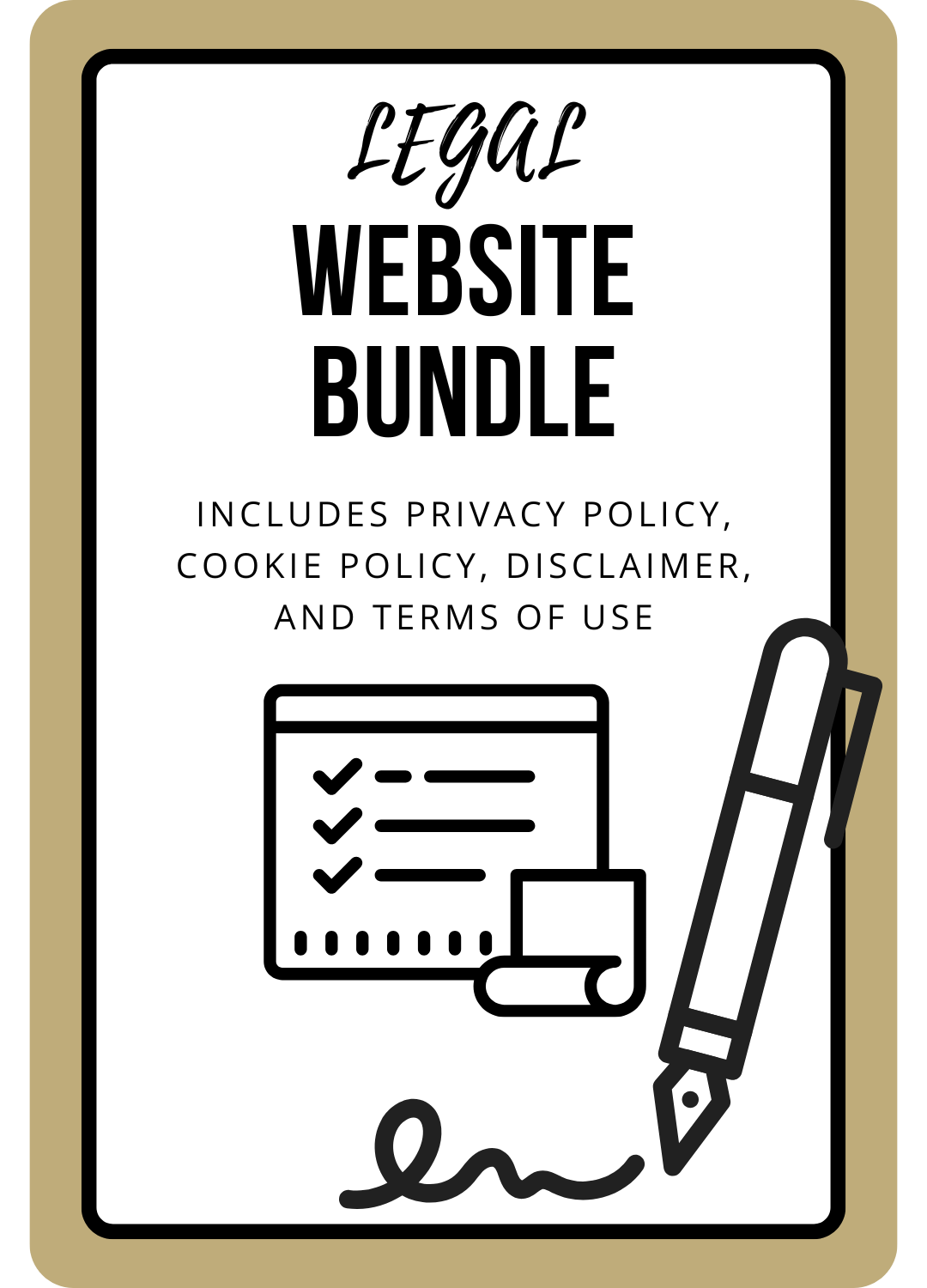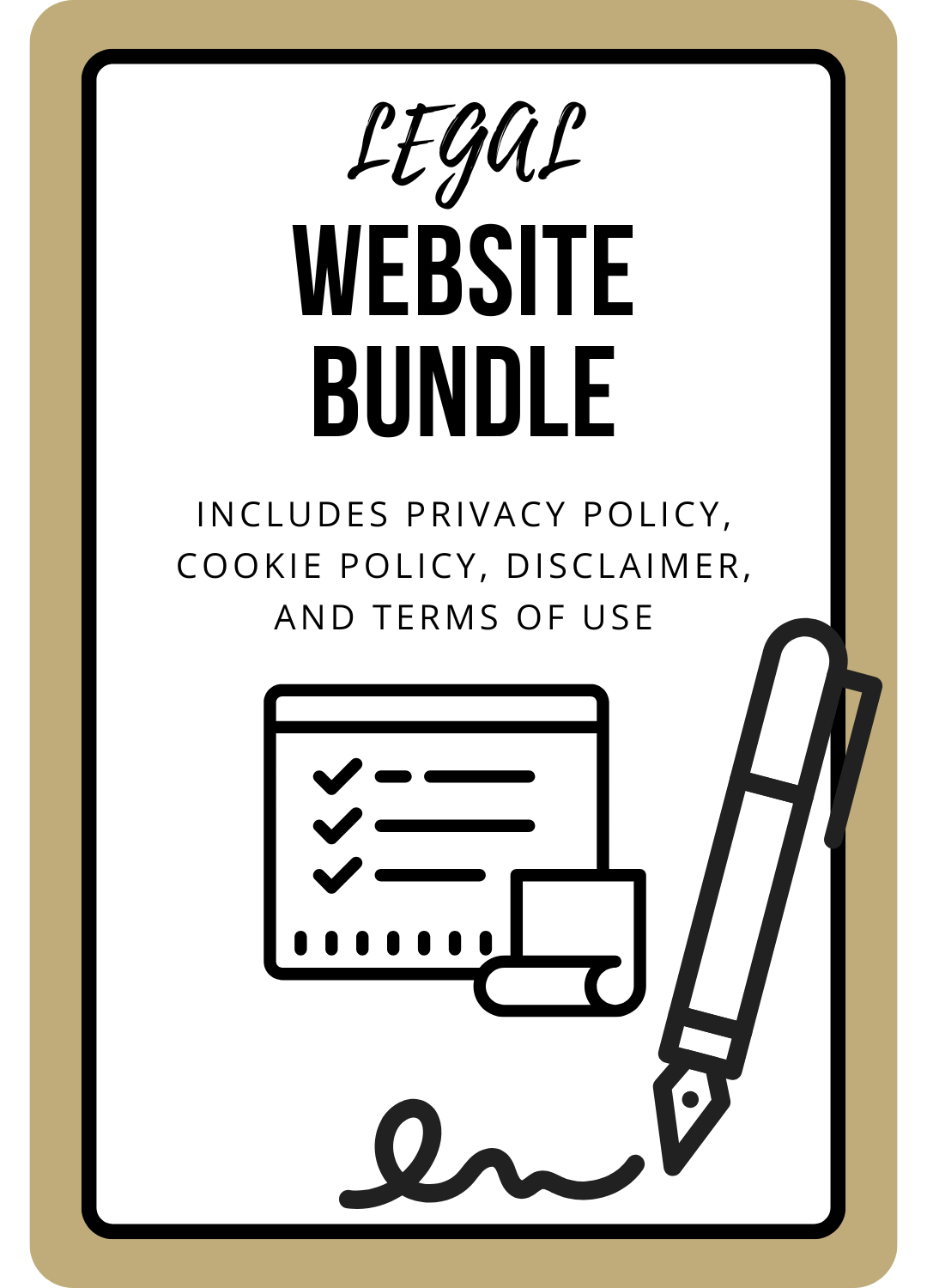10+ Must-Haves for Your Website Terms of Use (to Protect Your Content, Rights & Reputation)
Do you need website terms of use for your website? Absolutely! You need legally binding terms that tell visitors what they can (and can’t) do, clarify what content belongs to you, and limit your liability when things go wrong.
But here’s the problem: most online entrepreneurs either copy a website terms of use sample or use a random terms and conditions generator — and end up with something that barely fits their business.
Those generic terms may seem fine... until someone:
steals your blog post or digital download,
requests a refund you’re not required to give, or
blames you for something they did after reading your content.
Proper website terms of use go far beyond the standard clauses. It defines what visitors can and can’t do with your content, what you can do with theirs, and protects you against risks in your niche.
That’s exactly why I created a Website Terms of Use Template that’s fully customizable to your business.
In this post, you’ll learn the 10+ must-have clauses all website terms of use need to protect your content, reputation, and business — the protections most templates completely miss.
👉 Whether you’re a coach, creator, or digital business owner, this is your guide to writing (or upgrading) your website terms of use with lawyer-level precision — without paying lawyer-level fees.
Best Website Terms of Use
The 10+ Must-Haves for Comprehensive, Fluff Free Terms of Use
1. Website Use Rules — Stop Hackers, Bots & Spammers in Their Tracks
Your website terms of use must define exactly how visitors are allowed to use your site — and what they’re absolutely notallowed to do.
It’s what protects you from malicious users, data scrapers, and people trying to misuse your website or its content.
Common restrictions that terms of use for a website must include are:
❌ Uploading viruses, bots, or malware.
❌ Trying to hack, scrape, or copy data from your site.
❌ Using automated tools to harvest email addresses or contact info.
❌ Posting or submitting unlawful, offensive, or infringing messages or content on your website.
❌ Sending spam, commercial solicitations, or offensive material anywhere else online using your website.
Why it matters:
If someone tries to hack your website, flood your inbox with spam, or steal your content, these legal terms of use give you the right to suspend or block access immediately and limit your liability for any damage they cause.
It also reinforces that your website is for lawful, professional use only — not a playground for trolls or bad actors.
👉 You’ll find these protections — and all the legal safeguards you need to protect your site — inside my Legal Website Bundle, which includes the 3 essential legal pages you need to (including a website terms of use template).
2. Intellectual Property Rights — Protect Every Pixel of Your Content
Your website is full of your creative work — from blog posts and photos to course materials, templates, and brand visuals.
That’s exactly why your website terms and conditions must include an ironclad intellectual property rights clause that makes it crystal clear that you own all of your content — and no one else has permission to copy, share, or republish it without your consent.
Your website terms of use need to protect everything you create and publish on your site, including:
💡 Blog posts, articles, and digital guides
📸 Photos, videos, and graphics
🛍️ Digital products, templates, or course materials
🎨 Logos, brand elements, and other proprietary content
Without it, someone could reuse your content and claim it was “publicly available, so they didn’t know they couldn’t use it.” With it, you can prove ownership and take action when your work is stolen or misused.
Why it matters:
If you’ve ever seen your words, images, or downloads reposted elsewhere, you know how frustrating that is.
This clause gives you the legal foundation to demand removal, take enforcement steps, or even recover damages if necessary.
👉 My Legal Website Bundle includes a ready-to-use Website Terms of Use Template that already covers your copyright, trademark, and content protection clauses — so you never have to start from scratch.
3. License for Shareables — Control How Others Share Your Work
You might love when people share your content — but only when they do it the right way.
Your website terms of use should spell out exactly what visitors can and can’t do when they repost, quote, or embed your content elsewhere online.
This section of your website terms of use makes it clear that:
✅ You own all of your content — even if you make parts of it shareable.
✅ Visitors only get permission to share specific materials you’ve approved (like free guides, blog snippets, or images with your watermark).
✅ They must always credit you and link back to the source.
✅ They can’t edit, misrepresent, or use your content for commercial gain.
Why it matters:
Without these rules, someone could repost your content out of context, strip your branding, or use your materials in a way that misleads their audience — and you’d have limited legal recourse.
With it, you maintain control over your brand reputation, content integrity, and how your work is presented across the internet.
👉 You’ll find these clear rules in the Website Terms of Use Template included in my Legal Website Bundle, which includes all three essential website legal pages.
4. User-Generated Content & Testimonials — When Visitors Share on Your Site
What happens when a visitor leaves a comment, submits a testimonial, or shares content through your website?
Without a clear user-generated content clause, you could run into major legal headaches over how you use or repurpose content posted or submitted on your site by others.
Your website terms of use should spell out:
✅ Who owns the content that users submit (by agreeing to your terms of use, they automatically grant you a license to use it).
✅ That you can edit, remove, or refuse any content at your discretion.
✅ That visitors can’t submit anything that infringes anyone else’s intellectual property rights or privacy rights.
✅ That you have permission to repurpose testimonials, reviews, or submissions for marketing purposes.
Why it matters:
If a user uploads something that violates someone else’s rights, this clause protects you from being held responsible.
And if you want to showcase positive reviews or testimonials on your site, you already have the legal right to do so — no extra permission required.
👉 My Legal Website Bundle includes a Website Terms of Use Template that covers exactly how to handle user submissions, reviews, and testimonials — so you can feature client feedback with confidence.
5. Affiliate & Third-Party Links — So You’re Not Liable for External Sites
Your site will likely include links to other platforms — whether it’s an affiliate product you recommend, a guest article, or a partner resource.
But if one of those external sites turns out to be misleading, unsafe, or simply disappears, you shouldn’t be the one held responsible.
That’s why your website terms of use need a clause that clearly states you’re not liable for third-party websites or any issues that arise from them.
Your website terms and conditions should clarify that:
✅ You don’t own or control external websites, and can’t guarantee their accuracy, security, or reliability.
✅ Visitors click affiliate or external links at their own risk.
✅ You’re not responsible for damages, losses, or outcomes that happen after leaving your site.
Why it matters:
If someone clicks a link on your website and has a bad experience — like buying a product that doesn’t work or entering personal data on an unsafe site — this clause shields you from legal responsibility.
It draws a clear line: once users leave your website, their interactions are between them and that third party.
👉 You’ll find these protections — plus other key disclaimers for affiliate links, third-party tools, and content usage — inside my Legal Website Bundle, which includes all three essential website legal pages.
6. Legally Required Disclosures for Affiliate Links & Sponsored Posts
That brings me to affiliate links and sponsored posts. If you earn money through affiliate marketing, brand partnerships, or sponsored content, your website needs more than just generic website terms of use — you need legally required disclosure statements.
Sponsorship and affiliate link disclosures are non-negotiable under US, U.K., and EU advertising laws. They tell your audience when you’re getting compensated for promoting something — keeping you transparent and compliant with the FTC, CMA, and EU consumer protection guidelines.
That’s why your website should have an ironclad disclaimer page that:
✅ Clearly disclose when you receive affiliate commissions, referral fees, or free products.
✅ Makes clear that any reviews, recommendations, or sponsored posts reflect your honest opinions.
✅ Emphasizes that visitors must do their own research before relying on third-party links or recommendations.
✅ Clarifies that you’re not responsible for third-party content, products, or services.
Why it matters:
If you post affiliate links without proper disclosure, regulators can fine you — and brands may cut ties if your content violates compliance rules.
Disclosures also build trust with your audience. People are more likely to buy when they know you’re transparent about how you make money.
Protect Your Website with the Legal Website Bundle
You’ve now seen how much your website needs — from terms that stop hackers and content thieves to disclaimers that keep you compliant with affiliate laws.
Instead of piecing it all together from random templates, get everything done in one go.
✨ The Legal Website Bundle includes:
A Website Terms of Use Template — protects your content, defines visitor rules, and limits your liability.
A Website Privacy Policy Template — covers data collection, cookies, and compliance (GDPR, PIPEDA + U.S. State-specific privacy standards (beyond just the CCPA).
A Disclaimer Template — includes niche-specific clauses for affiliates, coaches, creatives, and online businesses.
You’ll also get:
✅ Fully customizable, lawyer-drafted templates.
✅ Step-by-step editing guidance so you can personalize them easily.
✅ Clear examples and optional add-ons to fit your niche and country.
👉 Protect your website, your content, and your reputation — all in one bundle.
Get the Legal Website Bundle →
7. No Warranties or Guarantees — Set Realistic Expectations
Whether you share business tips, DIY tutorials, or lifestyle advice, visitors must understand that your content is for informational purposes only — not a promise of outcomes.
That’s why your website terms of use should include a strong results & outcomes disclaimer that states:
✅ All information and materials on your site are provided “as is.”
✅ You don’t guarantee accuracy, completeness, or specific results.
✅ You’re not responsible for how visitors interpret or apply your content.
Why it matters:
Without this disclaimer, a reader could claim that your advice or content caused them harm — or that you “promised” a specific result.
By including it, you clearly set boundaries between guidance and guarantee, protecting your business from false expectations and liability claims.
👉 My Legal Website Bundle already includes a ready-to-use disclaimer — making it clear what your content does (and doesn’t) promise.
8. Limitation of Liability — Cap Your Risk Before It Starts
Your website terms of use must set legal limits on how much responsibility you take.
Fluff free website terms of use should include strong limitations of liability that clarify that you’re not liable for:
❌ Technical issues like website crashes, server errors, or downtime.
❌ Cyberattacks, viruses, or data breaches caused by third parties.
❌ Loss of income, profits, or data resulting from using your website.
❌ Any harm caused by how visitors use or misuse your content.
Why it matters:
If your website goes offline, someone downloads corrupt files, or a user misapplies your advice, this clause limits your exposure.
It ensures that you’re not held financially responsible for outcomes beyond your control — a crucial safeguard for any business owner operating online.
👉 You’ll find detailed language that limits your liability across multiple scenarios in the Website Terms of Use Template inside my Legal Website Bundle.
9. Indemnification — When Users Must Cover Your Legal Costs
Your website terms of use must include an indemnification clause that says that if a visitor’s actions cause you legal trouble, they’re responsible for covering your losses, costs, or legal fees.
Your terms of use should make clear that users agree to compensate you (and anyone working for you) if their actions result in:
✅ Legal claims, damages, or expenses against your business.
✅ Misuse of your website or intellectual property.
✅ Violation of your Terms of Use or Privacy Policy.
✅ Infringement of another person’s rights (like copyright or privacy).
Why it matters:
If a visitor uploads or submits something that violates someone else’s rights — and you get pulled into the dispute — this clause allows you to shift that liability back where it belongs: on the person who caused it.
It’s an extra layer of protection that ensures you’re not footing the bill for someone else’s mistake.
👉 The Website Terms of Use Template inside my Legal Website Bundle includes this clause fully drafted and ready to use — so you’re never left financially exposed when others misuse your site.
10. Governing Law & Dispute Resolution — Keep Legal Drama Close to Home
If a legal dispute ever arises, you don’t want to be dragged into a courtroom halfway across the world.
That’s where your governing law and dispute resolution clause comes in.
It specifies which country’s or state’s laws apply to your website and where disputes must be resolved — giving you control over the legal playing field.
Your website terms of use should make clear that:
✅ Any disputes will be handled under the laws of your country (or state).
✅ Proceedings will take place in your chosen jurisdiction.
✅ You reserve the right to recover legal costs if a user files an unreasonable or unsuccessful claim.
Why it matters:
Without this clause, someone from another country could try to sue you under their local laws — forcing you to defend yourself in a different country.
This clause ensures that all disputes are resolved under your own legal framework, saving you time, money, and stress.
👉 The Website Terms of Use Template inside my Legal Website Bundle includes a fully customizable governing law, jurisdiction, and arbitration options — so you’re protected no matter where your users are based.
✨ Bonus: Niche-Specific Disclaimers Every Website Needs
Even the strongest website terms of use can’t cover every risk.
That’s where your disclaimer page comes in — it adds the final layer of protection by addressing the unique risks that apply to your niche or industry.
Your disclaimer clarifies what your content is (educational, informational, or entertainment) — and what it’s not (professional, personalized, or guaranteed advice).
Depending on what you do, here are some of the key disclaimers your website should include:
For Coaches & Consultants -->Make it clear you don’t guarantee results and that no coach–client or professional relationship is formed through your site.
For Health, Fitness & Wellness Professionals --> Add medical or nutrition disclaimers that explain your content isn’t a substitute for professional advice, diagnosis, or treatment.
For Legal, Financial & Tax Experts --> State that your content doesn’t replace professional guidance, and you’re not responsible for actions taken based on your materials.
For Content Creators & Influencers --> Include clauses on affiliate links, sponsorships, and opinions — clarifying that recommendations are based on personal experience, not guarantees.
Why it matters:
Without the right disclaimers, you could be accused of giving unlicensed advice or making false claims — even unintentionally.
These statements show transparency, professionalism, and compliance with international regulations.
👉 You’ll find all of these niche-specific disclaimers + more inside the Legal Website Bundle, which includes your Website Terms of Use Template, Privacy Policy Template, and a comprehensive Disclaimer Template.
The ULTIMATE Website Terms of Use Template
Like any valuable asset, your website deserves real legal protection.
By now, you know exactly what your website terms of use should include — from rules that keep hackers and trolls out to disclaimers that keep you compliant and credible.
But instead of spending hours trying to piece together generic templates, you can protect your website properly in one step.
✨ The Legal Website Bundle gives you:
A Website Terms of Use Template — defines visitor rules, protects your content, and limits your liability.
A Privacy Policy Template — keeps you compliant with GDPR, CCPA, and international data laws.
A Disclaimer Template — includes all the niche-specific disclaimers you just read about (for coaches, creatives, service providers, and more).
All three pages are lawyer-drafted, fully editable, and written in plain English — so you can customize them in minutes without legal jargon.
👉 Protect your website, your business, and your peace of mind — starting today.
Get the Legal Website Bundle →
This post was all about the key essentials your website terms of use must have to legally protect your website.
Other posts you may like:







